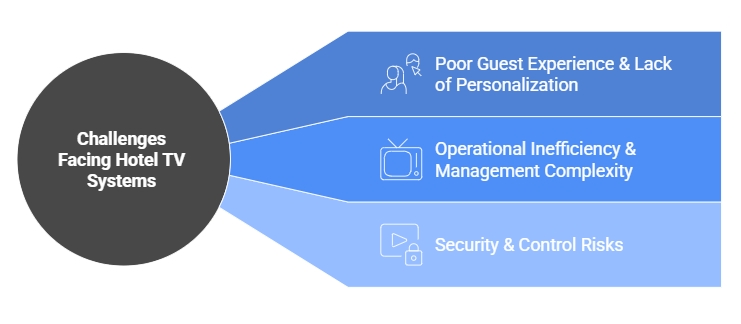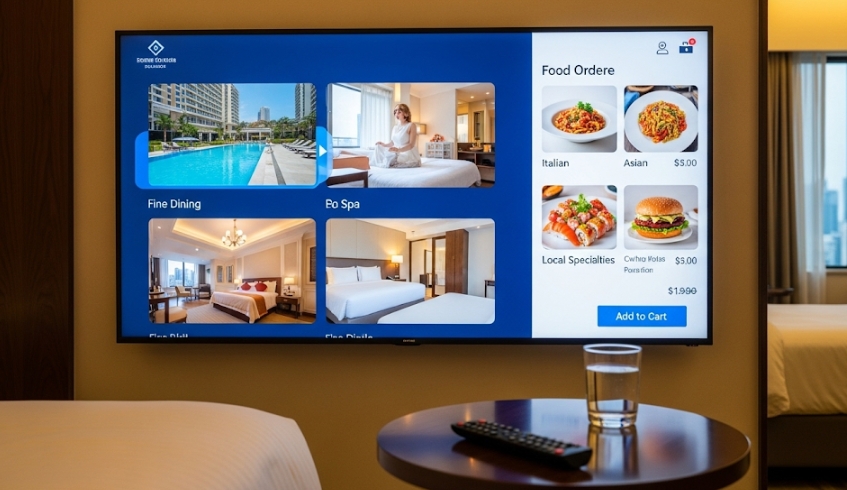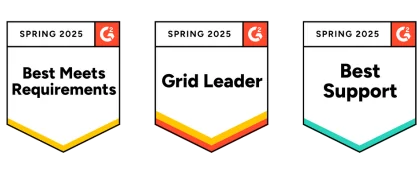The traditional in-room hotel television experience often falls short of modern travelers' expectations for personalized, interactive, and high-quality entertainment. Hotels frequently grapple with common challenges: a disconnect from Property Management Systems (PMS), difficulties in automated updates, complex operational workflows, and a lack of effective means to boost revenue and brand appeal.
Modern Hotel TV Solutions play a key role in elevating service standards and improving guest satisfaction in hospitality.
1What is a Hotel TV Solution?
A Hotel TV Solution refers to a comprehensive suite of integrated, multi-functional, and centrally managed systems and technologies. Its primary aim is to deliver an exceptional in-room entertainment and information service to guests, encompassing live TV, on-demand content, interactive services, and casting capabilities. Simultaneously, it empowers hotels with efficient centralized management, remote operational control, and robust environmental security.
A comprehensive Hotel TV Solution extends far beyond merely enhancing the guest's TV viewing experience. It functions as a dual-empowerment system:
- For the Hotel: The core focus is on efficient management, operational optimization, and robust security assurance.
- For the Guest: The core focus is on providing an outstanding entertainment, information, and service experience.
2Key Challenges Facing Hotel TV Systems Today
Hotels are currently navigating several significant hurdles with their existing television infrastructure:

1. Poor Guest Experience & Lack of Personalization
- Outdated & Inconvenient: Many hotel TV systems offer only basic channel playback, falling short of modern guest demands for personalized, interactive entertainment like streaming apps and mobile casting. Complex controls and multiple remotes frustrate guests.
- Limited Personalization: Hotels struggle to offer customized services or information based on guest preferences, diminishing the sense of exclusivity.
- Privacy Concerns: Guests worry about personal streaming account security or data residue after checkout, leading to privacy breaches.
2. Operational Inefficiency & Management Complexity
- Difficult Deployment & Maintenance: Manually configuring hundreds or thousands of hotel TVs is time-consuming and inefficient. A lack of remote management capabilities means IT staff must be physically present for troubleshooting or updates, leading to slow responses and high labor costs.
- Integration Issues: Existing diverse hotel TV brands and legacy systems often struggle to integrate seamlessly with modern Hotel Management Systems (PMS), limiting automation.
- Slow Content Updates: Inability to quickly update hotel TV content or applications results in outdated information, impacting efficiency and guest experience.
3. Security & Control Risks
- Device Misuse: Without effective locking mechanisms (like Kiosk Mode), guests can alter hotel TV settings or install unauthorized apps, potentially destabilizing the system.
- Network Vulnerabilities: Smart TVs are network devices that can pose security risks, potentially becoming entry points for breaching the hotel's internal network or data theft.
- Compliance & Data Leaks: Ensuring digital content adheres to copyright laws and preventing personal data from remaining on hotel TVs after checkout are critical challenges.
3Types of Hotel TV Solutions: Addressing Diverse Hotel Needs
To meet the diverse operational demands of hotels, Hotel TV Solutions can be categorized into the following primary types. These often work in synergy to form a comprehensive smart entertainment ecosystem within the hotel:

3.1 Mobile Device Management (MDM) Software
- What it does / What problem it solves:
It empowers hotels to remotely control and batch-manage all smart TVs in guest rooms. Manually installing apps, configuring settings, and troubleshooting issues on hundreds of smart TVs is incredibly time-consuming and labor-intensive. Guests might also tamper with hotel TV settings (e.g., downloading/unzipping apps, logging into personal accounts, changing settings), or the hotel TV might malfunction, requiring on-site intervention. MDM allows all these tasks to be performed remotely from an office. - What it is:
MDM software is a software solution focused on the lifecycle management and security control of smart endpoint devices within an enterprise or organization. In a hotel environment, smart TVs (especially commercial Android or Linux-based TVs) are considered a type of mobile device. MDM achieves communication and control with a central management server by installing an agent client on these devices. - Best for:
Hotels with a large number of guest rooms (especially hotel chains) and those utilizing a significant quantity of smart TVs. MDM can significantly boost management efficiency, reduce IT maintenance costs, and alleviate the workload of guest service staff.
3.2 IPTV/Live Content Distribution System
- What it does / What problem it solves:
It enables every room in the hotel to reliably and clearly watch a wide variety of TV channels. This system leverages the hotel's existing network infrastructure (Ethernet cabling) to transmit high-definition TV signals to each room, offering more channels, better picture quality, and easier management compared to traditional cable TV. - What it is:
This is a professional video content distribution infrastructure built on an IP network. Its core function is to convert traditional broadcast signals (e.g., satellite, terrestrial TV) or digital video sources into IP data streams, which are then efficiently and stably transmitted to TV endpoints in each guest room via the hotel's internal IP network. - Best for:
Hotels that want to provide high-quality live TV services. This is particularly beneficial for newly built hotels that can directly implement network cabling, or older hotels looking to upgrade their TV systems to offer more HD channels.
3.3 Cloud-Based Interactive TV Platform
- What it does / What problem it solves:
It transforms the hotel TV into a "smart concierge" and "service desk." This platform makes the hotel TV function like an oversized tablet, allowing guests to not only stream movies/shows but also order meals, request services, and access hotel information. It addresses the issue of traditional hotel TVs being unable to offer personalized, interactive experiences. - What it is:
You can think of it as the hotel TV's dedicated "operating system" or "App Store." It operates as a Software-as-a-Service (SaaS) model), where core functionalities, content management, and system control logic are deployed on cloud servers. Hotels simply subscribe to the service, and smart TVs in guest rooms connect to this platform via the internet to become interactive smart devices. - Best for:
Hotels aiming to elevate the guest in-room experience, make services smarter and more convenient, and achieve centralized, efficient content and system management.
3.4 Modular Multi-Platform Integration System
- What it does / What problem it solves:
It allows hotels to "customize on demand" their TV system, much like building with "Lego blocks." It breaks down various hotel TV functionalities into independent "modules," enabling hotels to flexibly select and combine features (e.g., only purchasing a "casting module" initially, then adding a "room service ordering module" later) based on their budget and specific needs. It addresses the pain point of hotels not needing all advanced features at once or having limited budgets for a full-scale deployment. This flexibility allows hotels to invest in phases, implementing essential functionalities first and gradually expanding in the future, avoiding excessive upfront investment and resource waste. - What it is:
This is essentially a design philosophy and technical framework. It disaggregates various hotel TV functionalities (such as casting, digital signage, in-room ordering) into independent, pluggable "modules." Hotels can then choose to purchase or enable one or more of these modules according to their specific requirements. - Best for:
Hotels with flexible budgets, diverse needs, or those looking to upgrade gradually. This includes boutique hotels that want to customize unique features aligned with their brand, or older hotels aiming to slowly integrate new technologies.
4MDM Software: The Core Driver for Smart Hotel TV Management
Mobile Device Management (MDM) software is crucial for efficiently managing and securing a Hotel TV Solution. Using AirDroid Business MDM as an example, here's how it optimizes Android TV management:
1. Remote Deployment & Unified Configuration:
MDM allows hotels to batch enroll hundreds or thousands of smart TVs and remotely push unified settings (Wi-Fi, language, time zones). This drastically simplifies setup for new rooms or system updates, eliminating the need for on-site IT personnel.
2. Precise App & Content Control:
MDM enables remote installation, updates, and silent uninstallation of hotel TV platform apps and streaming services. Through blacklisting/whitelisting, hotels can control which apps run, preventing unauthorized software and ensuring the hotel TV's dedicated purpose.
3. Robust Security & Kiosk Mode:
A key feature, MDM can lock TVs into a hotel-specific interface (Kiosk Mode), preventing guests from altering settings or accessing unauthorized functions. It also offers remote data wipe and device lock to protect guest privacy by clearing personal information upon checkout.
4. Cost-Saving Remote Troubleshooting:
MDM provides real-time device monitoring. If a hotel TV has an issue, IT can remotely view the screen, restart apps/devices, or transfer files without physical presence. This significantly speeds up problem resolution and cuts IT operational costs.
5. Enhanced Brand Image Customization:
MDM allows hotels to customize the TV's boot-up screen, wallpaper, and launcher interface, ensuring a consistent brand experience. Specific remote control buttons can also be mapped or disabled to guide guests to hotel services.
5Conclusion: Investing in Hotel TV Solutions, Driving the Digital Future of Hospitality
Modern Hotel TV Solutions have evolved far beyond mere entertainment tools. They have become a strategic digital infrastructure for hotels, crucial for elevating guest experience, optimizing operational management, expanding revenue streams, and enhancing brand image. The integration of specialized tools like MDM software further amplifies device management efficiency and security, making hospitality TV solutions a cornerstone of modern guest services.
Hotels are encouraged to embrace this digital transformation, carefully selecting and deploying hospitality TV solutions that align with their specific development strategies. By doing so, they can maintain a leading position in an increasingly competitive market and steer the hospitality industry towards a smarter, more connected future.









Leave a Reply.